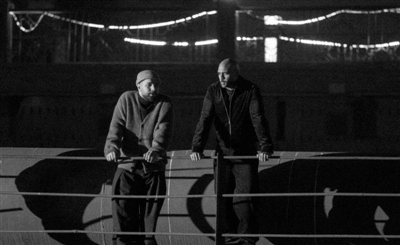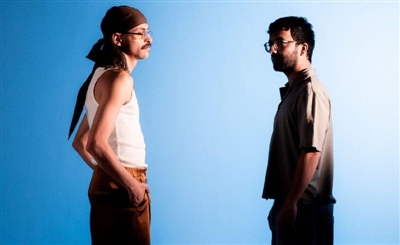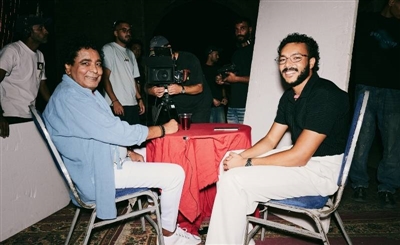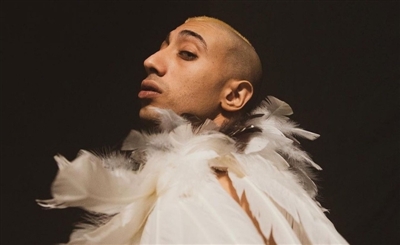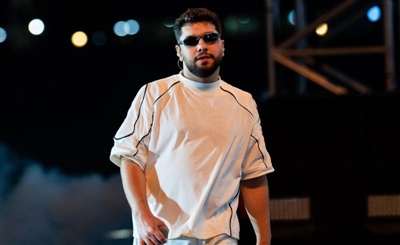The Egyptian-Portuguese Collab Transporting You Into Psychedelia
Did someone say Fairuz and Abd El-Wahab in Portuguese ?
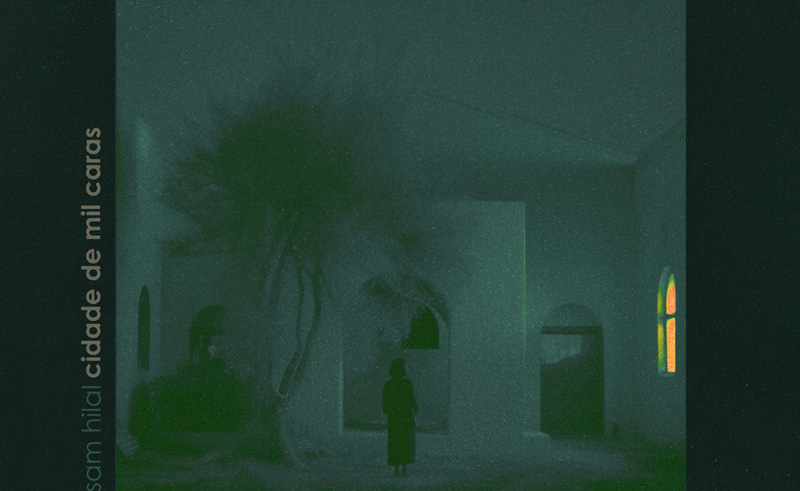
In a small art space in the heart of Lisbon, Portugal, Egyptian and Portuguese musicians came together in a live performance that fuses Arabic and Portuguese flavours, serving crowds a unique intercultural cuisine of sound. The fusion has once again been embodied in the six-track album ‘Cidade De Mil Caras’, which has just been released courtesy of Egyptian multi-instrumentalist producer & composer, Hossam Hilal.
Hossam is known for his experimental tendencies, merging African elements with the psychedelic and ambient, and it seems to be in full throttle in his fourth album. The unique sound materialised from a Portuguese-Egyptian collaboration based on the similarities between traditional Egyptian music and the sounds of Fado, Portugal’s very own music genre.
The following is an in-depth review of the first track in the album (which also happens to be our favourite), ‘Bateu-me à porta do peito’, which translates to ‘Knocked on my chest’.
The song starts off with a slow reverberating bass line which is looped throughout the whole track, setting the pace for the song and keeping you in a constant head-bobbing daze. We can hear the beats of a drum our ears are far too accustomed to, the Duff - manned by Hossam - hitting and tapping it in typical Arabic tone and rhythm.
The tempo starts to accelerate; the animal shrieks turn into erratic breathing, and the instruments run leading to a high crescendo which is suddenly cut off and calmed down, beginning another slow ascent and taking us on another ride. This is a recurring theme throughout the track, keeping us on our toes.
Into the spotlight comes the traditional Portuguese guitar, also known as the Fado guitar, which resembles the Oud in appearance, and sounds like a cross between it and a Sitar. The Fado Guitar is believed to be a direct descendant of the Oud, and this one in particular is played by Portuguese string master M-Pex.

High noSubtle squeals and shrieks mimicking animal calls start raining in adjacent to the instruments, encompassing us into a nocturnal cave-like ambiance . The vocal sound effects do not overtake the song, but instead go hand-in-hand with the instruments, filling the negative space with an almost animal-choir singing.
And no, that’s not a Oud you’re hearing, but actually the Double-Bass, manned by Portuguese free-improvisationist João Madeira, who elegantly and masterfully plays it in such an Arabic-infused fashion that you can practically taste the Al-Fishawy tea.
Two minutes in and it’s impossible not to feel like you’re in a Zar ceremony, which kinda makes sense since it’s believed that Fado music has Arabic roots dating back to Al-Andalus and the Umayyad empire.
High notes of the Fado guitar are picked in an ethereal way, almost signalling the arrival of royalty. In this case, the queen is Patrícia Domingues (the same person doing all the animal calls and breaths, by the way). The powerful and somewhat hefty voice of Domingues exerts the Portuguese lyrics with such force and fury that, even if you don’t speak the language, you can’t help but feel her intentions, her authority, her sadness, her loss.
As a matter of fact , you don’t even need to speak Portuguese to understand the lyrics, and some of you might even already know them, because here’s a surprise for you: the lyrics actually belong to FAIRUZ. Yep, Asfurrat- Al-Shark herself. The lyrics are translated into Portuguese from her song ‘Dakket Ala Sadry’. And here is where Hossam’s musical intellect really comes into scope, as the sombre lyrics of Fairuz’s song meld perfectly with the soul of Portuguese Fado music, which is characterised by melancholic tunes and lyrics, and infused with a sentiment of loss and longing.
The Saudade ends, bringing into centre stage the double-bass, taking this time a more classical approach in rhythm and flow, accented by high vocalisations and fleeting Fado guitar plucks in the background.
A Tambourine is added adjacent to the Duff, with taps and bumps emitting the sense of tired footsteps, pushing through a laborious journey. The jangles of the tambourine mimic the sound of shackles, adding to the struggle.
Nearing the end, we enter the final crescendo of the song, with all instruments in fast play, but this time in a disorderly - almost stumbling - fashion. Ending abruptly, the final soft notes of the double-base follow as if the last breath of relief and conquest, contrasted by a slight taste of bitterness, taken at the end of a long rigorous journey.
 A rollercoaster of highs and lows, an auditory mirage of musical notes and sound effects where you lose the ability to tell them apart, taking us on an expedition through caves and rough terrain. This is not a track; this is an experiential escapade, elevated by raw free improvisation and real time experimentation.
A rollercoaster of highs and lows, an auditory mirage of musical notes and sound effects where you lose the ability to tell them apart, taking us on an expedition through caves and rough terrain. This is not a track; this is an experiential escapade, elevated by raw free improvisation and real time experimentation.
Even the live recording quality used has this rustic inclusive flavour which amplifies the already immersive experience.
This is just a taste of what you’ll find in Hilal’s project. The artist collaborated with Portuguese poet Dinis Lapa to translate into Portuguese the lyrics of Fairuz’s ‘Law Kan Qalbi Mal’ in ‘E Nem Aceita A Culpa’, Mohamed Abd El-Wahab’s ‘Hand El Wed’ in ‘Ovum Dizer’, and two parts of a poem entitled ‘Cairo 90’ by Algerian writer Dalila Si Larabi about her relationship with Cairo.
Hilal worked on composing the tracks, using the same maqams as their respective Arab tracks, with intended spaces left for improvisation. The last track “Não creio que o zombo fará diferença” is the encore of the live concert and is the only fully improvised track in the album.
If you’re interested, you can even watch the live concert from which the album was recorded on Hossam Hilal’s YouTube channel.
We recommend listening to ‘Cidade De Mil Caras’ using headphones, to amplify the immersiveness of your experience.
Trending This Month
-
Nov 24, 2025



